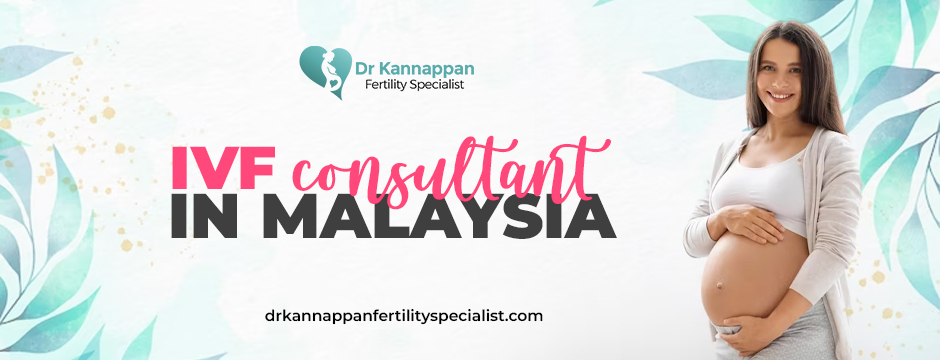The process of infertility is a deeply personal and frequently challenging that numerous couples encounter. It’s a journey filled with uncertainties, emotions, and important decisions. When conception doesn’t occur naturally despite months or even years of trying, couples often find themselves at a crossroads. It’s at this point that they may consider seeking help from a fertility specialist, such as Dr. Kannappan Fertility Specialist, and explore treatments like In Vitro Fertilization (IVF). In this blog, we’ll discuss common causes of infertility and when it’s advisable for couples to consult an IVF specialist and visit IVF clinic Malaysia for fertility treatment.
Understanding Infertility
Infertility is generally defined as the inability to conceive after a year of regular, unprotected intercourse. However, this timeline may vary based on age and individual circumstances. It’s important to note that infertility is not solely a female issue; both partners contribute to a couple’s fertility. Let’s explore some common causes of infertility:
1. Ovulatory Disorders
A significant percentage of infertility cases are due to ovulatory disorders in women. Conditions such as polycystic ovary syndrome (PCOS) and irregular ovulation can make it difficult to conceive naturally.
2. Tubal Issues
Blocked or damaged fallopian tubes can prevent the egg from meeting the sperm, making natural conception challenging. Tubal issues may result from infections, pelvic inflammatory disease, or endometriosis.
3. Male Factor Infertility
Male factor infertility, often related to sperm quality or quantity, plays a role in numerous instances. Factors like low sperm count, poor sperm motility, or abnormal sperm morphology can reduce the chances of fertilization.
4. Unexplained Infertility
In some cases, despite thorough testing, the cause of infertility remains unexplained. This can be particularly frustrating for couples, but it’s not uncommon.
5. Age-Related Infertility
Age is a significant factor in fertility. As women get older, their egg quality and quantity decrease, making conception more challenging. With age, men experience a decline in fertility.

When to Consider Consulting an IVF Specialist
Talking to an IVF consultant in malaysia should be considered when couples face certain situations or conditions that make natural conception difficult or when other fertility treatments have not been successful. Here are some scenarios in which consulting an IVF specialist is advisable:
1. Failure to Conceive After a Year of Trying
If you and your partner have been actively trying to conceive for a year without success, it’s recommended to consult a fertility specialist. This timeline may be shorter for women over the age of 35, as fertility declines with age.
2. Known Fertility Issues
If you or your partner have been diagnosed with specific fertility issues, such as polycystic ovary syndrome (PCOS), endometriosis, or male factor infertility, seeking the expertise of an IVF specialist can provide targeted solutions.
3. Recurrent Pregnancy Loss
Experiencing multiple miscarriages can be emotionally devastating. Consulting a fertility specialist can help identify underlying causes and explore options to prevent recurrent pregnancy loss.
4. Age-Related Fertility Concerns
For women over the age of 35 who wish to conceive, time becomes a critical factor. Seeking guidance from an IVF specialist can help assess fertility levels and explore appropriate treatments.
5. Previous Unsuccessful Fertility Treatments
If you have undergone other fertility treatments, such as ovulation induction or intrauterine insemination (IUI), unsuccessfully, IVF may be the next step. IVF offers a more advanced and effective approach.
6. Male Factor Infertility
Male factor infertility, such as low sperm count or motility issues, can significantly impact a couple’s ability to conceive. Consulting an IVF specialist can help assess and address these concerns.
7. Tubal Issues or Structural Problems
If you or your partner have blocked or damaged fallopian tubes, structural issues, or other complications that hinder natural conception, IVF can provide an alternative route to parenthood.

The Role of IVF in Fertility Treatment
In Vitro Fertilization (IVF) is a widely recognized and effective fertility treatment that involves the fertilization of eggs and sperm outside the body. IVF can address various infertility causes, making it a versatile option for many couples. Here’s how IVF works:
1. Ovulation Stimulation: The woman undergoes hormonal stimulation to produce multiple eggs. This is monitored closely with ultrasound and blood tests.
2. Egg Retrieval: Once the eggs are mature, they are retrieved through a minimally invasive procedure.
3. Fertilization: The retrieved eggs are then fertilized with sperm in a controlled laboratory environment.
4. Embryo Culture: Fertilized eggs develop into embryos in the laboratory, typically over a few days.
5. Embryo Transfer: One or more healthy embryos are selected and transferred into the woman’s uterus, where they can implant and result in pregnancy.
IVF offers several advantages, such as the ability to address specific fertility issues, select genetically healthy embryos (with pre-implantation genetic testing), and provide hope for couples who have struggled with infertility.
Conclusion
Infertility can be hard, but there is hope. If you find yourself facing difficulties in conceiving, consulting an IVF specialist, such as Dr. Kannappan Fertility Specialist at IVF Centre In Malaysia can provide you with valuable insights, personalized treatment options, and the support needed to navigate the path to parenthood. Whether your infertility is due to ovulatory disorders, male factor issues, or unexplained causes, IVF is a powerful tool in modern medicine that can help you achieve your dream of starting or expanding your family. Remember that you are not alone on this journey, and there are dedicated professionals ready to assist you every step of the way.
